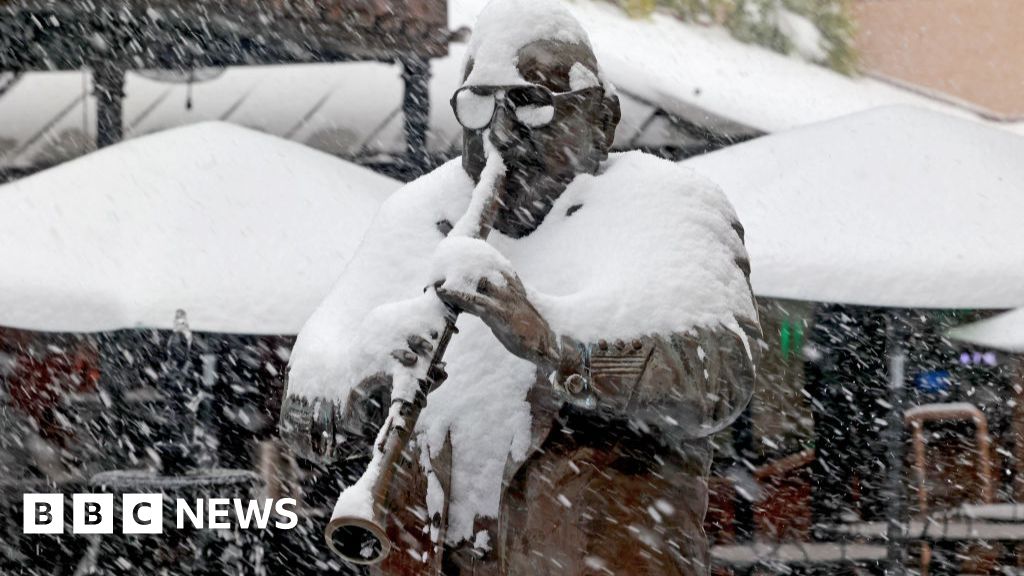ARTICLE AD BOX
Watch: Moment top US university heads evade question on genocide
By Nomia Iqbal and Alexander Lederman
BBC News, Philadelphia
The University of Pennsylvania's president has resigned after criticism of her testimony to Congress about antisemitism on campus. Her comments had intensified the already polarised mood at one of America's oldest colleges.
Noah Rubin is one of the many Jewish students at Penn who had called on Elizabeth Magill to step down.
He says he has struggled with the atmosphere on campus in Philadelphia since the 7 October Hamas attacks in Israel.
As co-President of the Penn Israel Public Affairs Committee, he wears his bright blue skullcap proudly, but admits it's a day-by-day choice whether to continue displaying his faith in such a way.
He was particularly troubled by a protest last week, where some students were chanting "Intifada", the term given to violent Palestinian uprisings, but which is also considered by many Palestinians and those who support their cause as a call to end the occupation.
He says protesters also chanted "From water to water, Palestine will be Arab", referring to the River Jordan and the Mediterranean Sea.
Many Jews - including Noah - believe this refers to the destruction of the Israeli state in its current form, but pro-Palestinian activists contest this, saying the slogan is talking about the rights of Palestinians to freedom and justice.
At the congressional hearing on Tuesday, Ms Magill was asked whether calling for the genocide of Jews violated the university's code of conduct or rules regarding bullying and harassment. She replied that it was "context dependent".
Ms Magill later apologised, saying she had been focused on the "university's long-standing policies - aligned with the US Constitution - which say that speech alone is not punishable". Harvard President Claudine Gay, who appeared alongside her, also later apologised.
For Noah, Ms Magill's response was not enough. "Her apology is pathetic," he said in an interview on Friday before she resigned. "Why couldn't she have said it under oath when hundreds were watching?"
The University of Pennsylvania's leadership has been grappling with huge divisions over the Israel-Gaza war since it began. Students and faculty members with different views on the conflict all say they have been targeted and criticised for their respective positions.
Ms Magill's comments have brought more scrutiny of the university's free speech policy. For decades it has been in line with the First Amendment, which protects free speech. However, the US Constitution does make an exception for true threats - statements that communicate to a person or group an expression of intent to cause them unlawful physical harm.
As a private university, Penn is not required to uphold First Amendment protections in the same way it would if it were a public institution. However, because it accepts some federal funding in the form of grants, the university may have felt it faced potential legal risk if it was deemed to have violated students' free speech rights.
For many, Ms Magill's mistake was treating her congressional hearing like a court appearance, rather than an opportunity to give moral clarity on what they felt was a simple question.
Some have a different view. The Foundation for Individual Rights and Expression, a civil liberties group which advocates for free speech, said that while it condemned her comments, the answer was to end all censorship rather than expand it.
Mia Antonacci, 20, is a member of the group's campus scholar programme. As a Jewish woman, she admits she is conflicted.
"I totally understand from a legal standpoint that this speech is OK - also, we should invite speech that makes us uncomfortable and challenges our opinions," she says. "But what she said made me, my friends and large communities here uncomfortable."
The university now faces an official congressional investigation on its efforts to address antisemitism.
PhD student Hillah Kohen, an Israeli American who advocates for Palestinian rights and is highly critical of Israel's military response in Gaza, was in the audience for the hearing. The 27-year old described Ms Magill's answer as "incompetent", but also accused her questioner, Republican Elise Stefanik, of being opportunistic.
Hillah, whose great-grandparents died in Auschwitz, is worried about attempts on and off campus to "divide and conquer" communities.
"When we see antisemitic graffiti and swastikas on the walls of our buildings, what we need to do is come together as Jewish students to talk about how the safety of all of us is intertwined on this campus - Jewish safety with Palestinian safety and our freedoms too."
An Arab medical student, whom we are calling Sayyid, asked for anonymity over fears he might face retaliation for speaking out. He told the BBC he was disappointed with Elizabeth Magill, but recognised she had been under pressure from all sides since the war began.
However, Sayyid argued, pro-Palestinian voices did not have the same influence on campus as supporters of Israel. While the president repeatedly condemned Hamas, for example, he said many students believed the college should have spoken out more forcefully about the thousands of civilian deaths in Gaza.
"The University's administration is focused on one side more than the other because it is tied to donations," Sayyid told the BBC.
Soon after the president's appearance before Congress, a major donor withdrew a $100m (£79.3m) grant, saying he was appalled by her testimony. Just over a day later and Ms Magill was gone.
Her resignation will not end the deeply polarised debate over the Israel-Gaza war roiling the University of Pennsylvania and so many other US college campuses.
But reaction to her comments this week had produced rare unity among the students we spoke to: all agreed that the president hadn't handled the hearing well.
"She was attempting to maybe try and represent both sides, but what she said at the congressional hearing was not appropriate and did come off as antisemitic," says Sayyid. "I can understand why students were hurt."

 1 year ago
24
1 year ago
24








 English (US) ·
English (US) ·